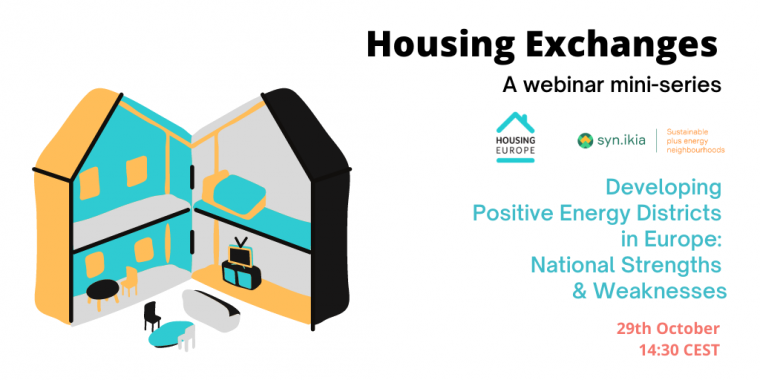Developing Positive Energy Districts in Europe: National Strengths and Weaknesses
29th October 2020 | Zoom Webinar | 14.30 - 15:40 CEST
Online, 29 October 2020Save the date
The objective of this Members’ webinar is to identify opportunities and bottlenecks to the implementation of Positive Energy Districts (PEDs) / Zero Energy Districts (ZEDs) in existing legislation and policy across Europe. Could PEDs/ZEDs be developed in your country for more affordable and liveable neighbourhoods?
The overarching 2015 Paris Climate Agreement lays the political landscape to achieve net-zero emissions in the second half of this century by all parties involved to keep a global temperature rise this century well below 2°C above pre-industrial levels. Following this, the European Commission’s U Green Deal strives to make Europe “the first climate-neutral continent” by 2050.
At the same time, several EU policies provide a legislative framework to help Member States reach these targets, namely: the Renewable Energy Directive (RES), the Energy Performance of Buildings Directive (EPBD), the Energy Efficiency Directive (EED), the EU Emissions Trading System (ETS), the Effort Sharing Regulation (ESR) and the Electricity Directive (2009/72/EC). Each Directive has specific importance for supporting the development of PEDs/ZEDs and decarbonising the building stock.
Most notably, the EPBD paves the way for the reduction of energy demand from buildings across Europe. It requires each Member State to develop regulations and packages to improve the energy performance of their buildings and defines the concept of ‘zero energy’. It requires Member States to establish NZEBs as the new building standard in building codes or regulations from 2021.
According to the Joint Research Centre (JRC), PEDs or ZEDs are understood as a group of buildings such as a city district, community, village, cluster of buildings or campus, with a stated goal of achieving positive or zero energy, respectively, producing at least the same amount of energy as they demand, whose reduced energy demand is produced by on-site or nearby renewable energy.
Amongst the many advantages that PEDs/ZEDs can provide, some of them include: economies of scale and cost-effectiveness for building owners, district regeneration, unlocking investment opportunities and many services and techniques that may not be available on an individual building scale, such as wastewater recycling, rainwater harvesting or district heating and cooling. But most importantly, PEDs/ZEDs have the potential to turn deprived neighbourhoods into liveable and valued ones through better stakeholder collaboration, community involvement, job creation, boosting of the local economy, reduced energy poverty rates, better local shared spaces and better air quality.
As part of Housing Europe’s work for the EU-funded H2020 syn.ikia project on Sustainable Plus Energy Neighbourhoods, we are gathering a complete overview of the current state of the existing legislation on PEDs/ZEDs in four different countries in Europe (Norway, Spain, Austria and the Netherlands) to validate their functionality.
___________________________________________________________________________
Focus of the discussion
What is the existing policy framework in your country in the areas of district approach, energy efficiency, renewable energy, digital technology and affordable living, health and wellbeing?
Does it facilitate or prevent the development of PEDs/ZEDs?
___________________________________________________________________________
Agenda
Moderation
Julien Dijol, Policy Director at Housing Europe
14:20 - 14:30
Login, connection
14:30 – 14:33
Introduction – Julien Dijol, Housing Europe
14:33 – 14:43
Positive Energy Districts in Europe and Renovation Wave – Océane Peiffer-Smadja, Policy Officer DG GROW, European Commission
14:43 – 14:46
syn.ikia project: Sustainable Plus Energy Neighbourhoods – Clara Mafé, Housing Europe
14:47 – 15:25
Positive/Zero Energy Districts national policy frameworks
Tore Johannesen - NBBL, Norway
Joan Estrada - INCASOL, Spain
Gerlinde Gutheil-Knopp-Kirchwald, GBV - Austria
Robin van Leijen, AEDES - Netherlands
15:25 – 15:35
Debate and Q&A
15:35 - 15:45
Conclusions – Sorcha Edwards, Secretary General, Housing Europe
________________________________________________________________________
Join the conversation also on social media via the #OurHomesOurDeal hashtag
'Our Homes, Our Deal' is Housing Europe's initiative to benchmark the work done within the public, cooperative and social housing sector on building and renovating homes in an energy and resource-efficient way.